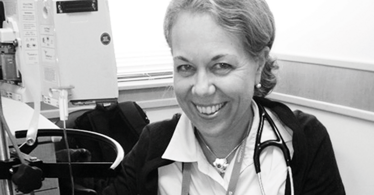Cell Therapy Virtuoso
Sitting Down With... Catherine Bollard, President of the International Society for Cellular Therapy (ISCT).

What inspired you to follow a medical career?
When I was 18 years old, I had to decide between medical school or opera singing. I chose medicine, thinking that I could revisit singing after qualifying – and I continued my voice training throughout medical school. After obtaining my medical degree, I moved to London to continue my opera training at Guildhall. But my husband was a musician too, and it was hard for a couple of poor musicians to live in London! I did a locum at St Bartholomew’s in pediatric hematology and oncology – and I absolutely loved it. One day, when I was exhausted after being on call for 96 hours, my music teacher told me that I had to give up medicine. Medicine or singing? It was heart-wrenching, but I opted for medicine. I still keep up the music as a hobby – and I think the characteristics of a good doctor are similar to those of a good musician: one fixes the body and the other mends the soul.
How did you become interested in cell therapies?
In the 80s, my best friend in high school, Diana, developed Hodgkin’s lymphoma. Treatment comprised multiple cycles of chemo- and radiotherapy, but finally she went into remission. Later, she was diagnosed with myelodysplastic syndrome – a direct consequence of the Hodgkin’s therapy – and died soon afterwards of leukemia. It was so cruel, and it became clear to me that we needed therapies that only kill the cancer cells and not healthy bystander cells. As a result, I became interested in cellular immunotherapy.
My mentor in New Zealand was friends with Helen Heslop and Malcolm Brenner – two leading immunotherapists at Baylor College of Medicine in Houston, USA – and I agreed to work with them on neuroblastoma. But when I arrived, the neuroblastoma post-doc decided to stay on, while another (who had been working on Hodgkin’s lymphoma) left, so I was able to work on lymphoma – one large focus of my career ever since. We’ve now developed a T-cell therapy that gives complete remissions in over 50 percent of some patient groups, and two-year progression-free survival rates of over 90 percent in other groups. Cell Medica is taking this product to licensure. It’s exciting, but also very sad. If Diana had been diagnosed today, her outcome would have been completely different.
How did you get involved with ISCT?
When I was at Baylor, my boss, Dr Brenner, was President of ISCT so of course he encouraged us all to join! I really enjoyed its bench-to-bedside philosophy and the fact that it encompassed all aspects of cell therapy. I became President in 2016.
What is ISCT’s current focus?
ISCT’s mission is to “drive the translation of cellular therapies for the benefit of patients worldwide” and to “improve patients’ lives through safe and effective cellular therapies”. At the moment, we’re very focused on maximizing our growth in terms of membership, as well as reaching out to the community through current and new collaborations. As new cell products become available, I would like to see ISCT support the IND-enabling studies that bridge “the valley of death” – the early phase studies where success is critical for generating corporate interest and later phase licensing studies.
What are your goals for 2017 as President of ISCT?
In recent years, the society has enhanced its regenerative medicine profile, and I now wish to build its profile in immune cell-based therapies, especially in cancer immunotherapy. 2017 marks ISCT’s 25th anniversary and I’m hoping to engage past-ISCT presidents – who were the early drivers of cancer cell therapy – to re-energize this arm of ISCT.
The ISCT also has a responsibility to help younger professionals develop the necessary skills to contribute to the field. Training the next generation of cell therapists is a passion of mine; in 2015, I helped develop an intensive cell therapy training course with the American Society of Blood and Marrow Transplantation. The first course was very successful so we’re doing another this year.
What do you think will help to further advance the field?
I’d like to see more collaboration between pharma companies – not only in terms of developing a given cell therapy, but in the development of combination treatment strategies utilizing immune and cell based therapeutics. For example, if cancer is to be cured, it will most likely require immunotherapy combinations, which will require this sort of collaboration. ISCT is well-positioned to facilitate collaboration between pharma companies as our commercialization committee has developed close working relationships with industry and academia.
What are the most exciting changes you’ve seen in the cell therapy field?
The field has expanded dramatically over the last 25 years. In particular, T-cell therapies for cancer have grown rapidly and now the field is expanding into other areas, such as regulatory T-cells for autoimmune disease and virus T-cells for HIV. Given what the immune system can do, the applications are almost limitless. Technological advances now place this diverse array of treatments within reach of generalizability. Ongoing issues include the question of whether we should have centralized or decentralized GMP facilities – or perhaps even a “GMP in a box” approach where blood and reagents go in and your product comes out!
ISCT will celebrate its silver jubilee at its upcoming annual meeting on May 3-6 in London, UK. Visit http://isct2017.com/ for more details.
Catherine Bollard is President of the International Society for Cellular Therapy (ISCT).















